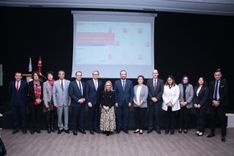“We are looking forward to all ministries, institutions and state structures engaging in this project as it is an important step towards digitalisation of the government, as well as the digital transformation of the country in various fields.”
In 2023, Cybernetica and EBRD (European Bank for Reconstruction and Development) signed an agreement to implement a national interoperability platform in Tunisia. The platform consists of a software implementation for services and data exchange between administrations. The project is funded by SECO (Swiss Government).
The agreement aims to support the Tunisian government in setting up an interoperability platform to enable the delivery of Government-to-Government, Government-to-Business, and Government-to-Citizen services. This project represents a significant step forward for Tunisia in achieving its National Strategic Plan "Digital Tunisia 2020-2025". With priorities including ICT governance, digital infrastructure, cybersecurity, and data-driven government, the roll-out of e-identity and interoperability are the foundational building blocks of delivering the plan's objectives.
To achieve this goal, Cybernetica has been deploying its secure data exchange solution, the Unified eXchange Platform (UXP), as a proof-of-concept (PoC) for a selected cohort of five Tunisian ministries. Cybernetica has also contracted with PwC Tunisia for the provision of local support for the project in Tunisia.
Over the past 10 months, Cybernetica and PwC have successfully implemented the foundation of the national interoperability platform by setting up the central governing authority and onboarding the first 5 member organisations. Alongside the technical implementation, Cybernetica and PwC have delivered extensive knowledge transfer and capacity building to support ownership over the national platform and its further scaling.
The implementation effort is led by the Tunisian Ministry of ICT. Stakeholders have focused on the go-live phase of the platform, finalising Phase 1 of the implementation and have been working on the scaling of the platform in the next phases. It is foreseen that after the implementation, UXP will be the basis of a secure nation-wide interoperability system that allows organisations to exchange information peer-to-peer between each other, essentially becoming an e-government platform of the country.
Tunisian Minister of ICT, H.E. Mr. Nizar bin Naji, emphasised the importance of the new platform: “We aim to facilitate transactions between the citizens, the government and the structures between them. Namely, in terms of reducing deadlines, saving time and reducing errors that may occur when processing files. We are looking forward to all ministries, institutions and state structures engaging in this project as it is an important step towards digitalisation of the government, as well as the digital transformation of the country in various fields.”
“We at Cybernetica are delighted to work with the government of Tunisa for the deployment of our Unified eXchange Platform as the central interoperability platform. Our journey for the last 10 months in Tunisia has been excellent – we have found great leadership and received a strong commitment from the government to drive change, which in these digital transformation projects is absolutely crucial. We are really looking forward to the rest of the journey ahead!” said Oliver Väärtnõu, CEO of Cybernetica. “We’re also delighted with our first collaboration with EBRD, whose role in supporting the digitalisation of countries is becoming more and more important, and with the collaboration of Switzerland’s SECO (Economic Cooperation and Development Organization). Last but not least - for Cybernetica, it is always important having local partners – our collaboration with PwC Tunisia, who provides country knowledge and consulting services, is the key to success in this project,” he continued.
As a critical foundation for e-governance, the interoperability platform will support the development of a vast array of digital services and thereby open new possibilities for creating positive socioeconomic impact. The next steps include scaling the platform across all Ministries, and building the capacity and processes required to fully leverage the potential of the national interoperability platform, including creating individual services.
The UXP data exchange platform developed by Cybernetica is based on the technical principles of Estonia’s X-Road, which enables secure data exchange among independent organisations and their information systems. The technology includes features for digital signatures and encryption, ensuring the privacy and security of citizens' data.
The UXP has already been implemented in over 12 countries around the world, including Ukraine, Japan, Benin, Namibia, Greenland, Bahamas and others.
